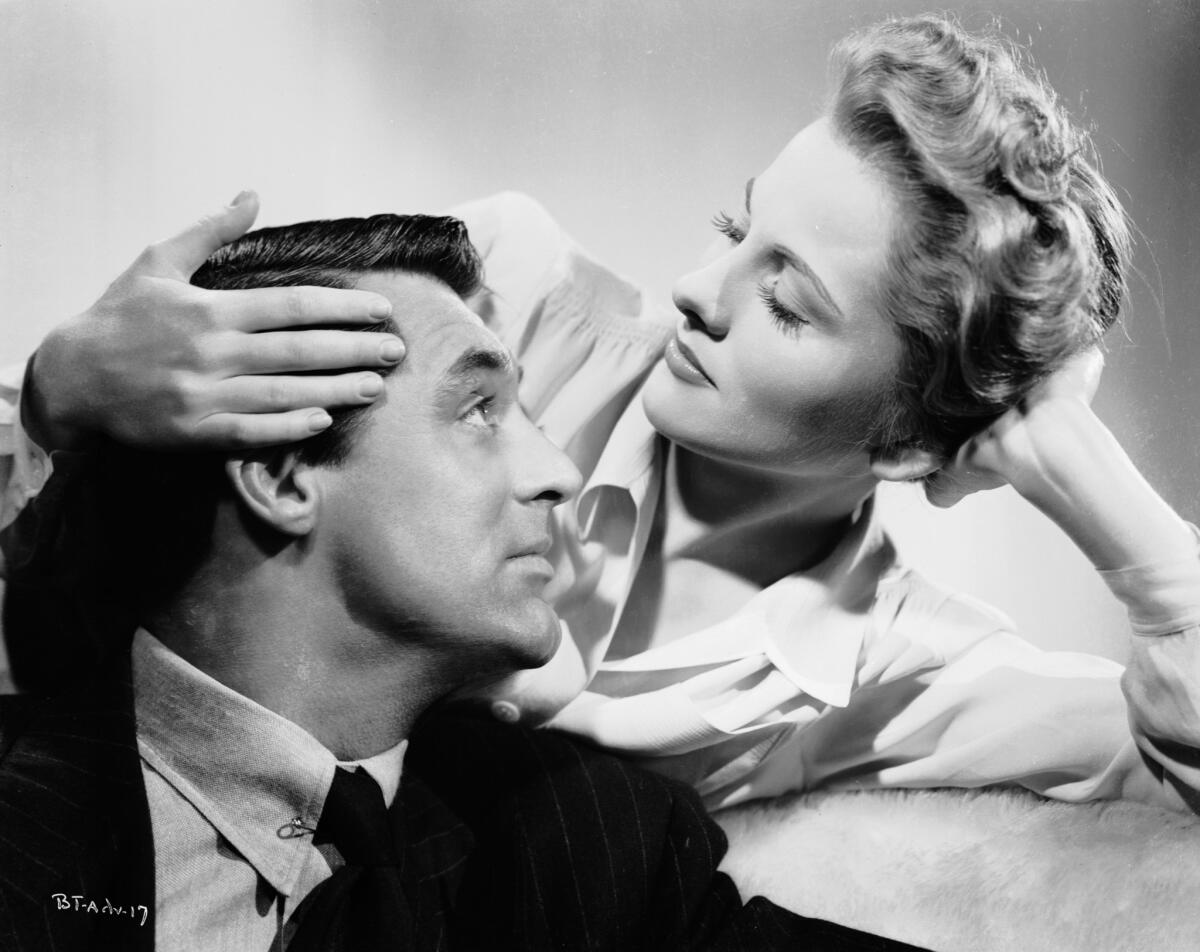From the Archives: A look back with ‘Suspicion’ and an 1941 opinion that stands the test of time

Joan Fontaine is married to the charming but untrustworthy Cary Grant in ‘“Suspicion,” directed by Alfred Hitchcock.
Editor’s note: “Suspicion,” directed by Alfred Hitchcock and starring Joan Fontaine and Cary Grant, opened in November 1941. The film was nominated for three Academy Awards, including best picture and best score, and Fontaine won for best actress. Tuesday, Warner Archive is releasing a Blu-ray edition of the film to commemorate the 75th anniversary. Below is Edwin Schallert’s original Jan. 21, 1942, review for the Los Angeles opening.
Circumstantial evidence is all against Johnnie Aysgarth ( Cary Grant) in the mind of his wife, Lina Aysgarth (Joan Fontaine). Everything, therefore, weaves a web of suspicion. Which is why the current attraction at RKO Hill Street and Pantages Hollywood theaters carries the title it does.
Known once as “Before the Fact” (that was the name of the original story by Francis Iles), “Suspicion” is the latest feature by Alfred Hitchcock, famous for “The Thirty-Nine Steps,” “Foreign Correspondent” and “Rebecca.” Definitely it is an intriguingly different sort of screen offering for this very original movie maker. The very odd narrative exerts what might almost be termed an exotic spell — though this has naught to do with tropics or anything like that.
SIGN UP for the free Classic Hollywood newsletter >>
Its setting English, “Suspicion” can, perhaps, best be called a psychological thriller with much more emphasis on the psychological than the thriller part of the description. It is above all else a study — chiefly the study of a woman’s mind, as affected by extraneous and peculiarly undermining influences.
Grows like monster
She loses faith in her husband to the extent that she actually believes he is going to kill her, and it’s all because of a buildup of small incidents, which seem to point to one sinister goal and end.
Truly the suite (or train) of happenings is ingeniously devised, which causes suspicion to take root in the woman’s brain and grow finally into a thorny and forbidding monster of mental vegetation.
Aysgarth is presented as a strange mixture of gambler, fortune hunter, blatherskite, ne’er-do-well and what not. Yet Lina, who it is thought (before her marriage) may become a spinster, is fascinated by him and even indulges him and his spendthrift ways.
He is guilty of numerous falls from grace in her eyes, mainly sharp practice, shifty handling of money and other things valuable, and even misappropriation of funds entrusted to his care.
In trying to cover up his indiscretions, It comes to appear that he had possibly been the indirect cause of the death of a friend who was in with him in a business enterprise, and furthermore — most tormenting — that he may be endeavoring to see to it that his wife depart the earth so he can get her insurance.
Well spun
Yes, indeed, the web is tightly spun, so that at times even the audience believes as the woman does. At other times doubt intrudes. This is where “Suspicion” shines as especially deft and adroit, and loyal also to Hitchcock precedent for keeping both characters and spectators guessing in different ways.
The ending is possibly somewhat abrupt, and there was another, I believe, more desired by the director himself. In toto, the picture is unique and holds marked interest. It evokes some curious reactions of laughter during the scenes when the wife feels that she is menaced even with poisoning.
Only this is to be said, that “Suspicion” is not quite as strong as, possibly, some of the director’s best preceding films. In one respect, though, it must be reckoned especially notable — the portrayal of Joan Fontaine.
You have doubtless already heard that she was designated by the critics circle of New York as outstanding. Unquestionably it is she who carries the large burden of exactly and painstakingly registering the production’s intent and it is a rare performance for any year.
Grant an element
Grant is very clever in what he does to deceive; it is one of those dexterous interpretations that he has made his special line. Nigel Bruce is also very noteworthy, gets a real and deserved chance. I like the work of Isabel Jeans, Heather Angel, Dame May Whitty and Sir Cedric Hardwicke in that order. Others include Reginald Sheffield, Auriol Lee and Leo G. Carroll. It is stated, though not so credited, that Harry Edington merits recognition for supervision of this film.
On the program is also “The Mexican Spitfire Baby” with Lupe Velez, Leon Errol doing his Uncle Matt/Lord-Epping duty, Charles “Buddy” Rogers, ZaSu Pitts, Elisabeth Risdon, Fritz Feld, Marion Martin, Lloyd Corrigan and others. They secure enough laughs to satisfy in this supplementary entertainment directed by Leslie Goodwin.
More to Read
Only good movies
Get the Indie Focus newsletter, Mark Olsen's weekly guide to the world of cinema.
You may occasionally receive promotional content from the Los Angeles Times.






